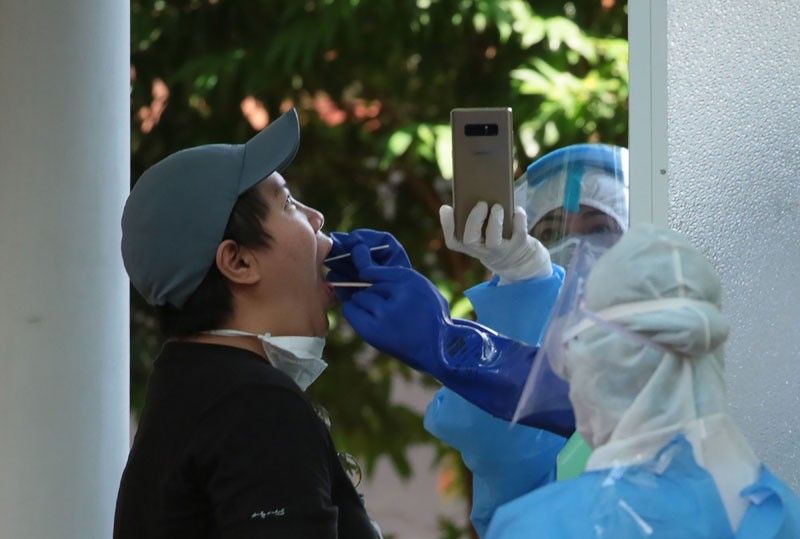COVID mass testing begins in Metro Manila today

MANILA, Philippines — Mass testing for coronavirus disease 2019 (COVID-19) infection begins today as scheduled, a day after Manila and Quezon City kicked off their own localized testing.
The long-planned mass testing is finally taking off as the number of COVID-19 cases in the country reached 4,932, with the death toll now at more than 300, according to data released by the Department of Health (DOH) yesterday. Recoveries totaled 242.
Health Undersecretary Maria Rosario Vergeire also announced that 1,429 people have completed the online biosafety course organized by the University of the Philippines-Manila.
Vergeire said over 300 volunteer-medical technologists, molecular biologists, laboratory technicians and researchers would be deployed “strategically” to laboratories in coordination with the Institute of Molecular Biology and Biotechnology of UP-Manila’s National Institutes of Health.
“We are expanding our testing capacity… but we want to make sure that there are enough health workers in every facility,” she said.
Vergeire said they are also working with the Department of Science and Technology on the use of equipment and supplies for lending to DOH.
She said so far, six polymerase chain reaction (PCR) machines are now being matched with some laboratories certified by the DOH to do the testing.
“The laboratories are implementing extended operating hours to make sure that they can do more testing. We have 15 laboratories now, but (the number) is expected to expand as we are speeding up the evaluation of applications for certification of 28 laboratories across the country,” she added.
Qualified for testing are those with severe conditions, the elderly, pregnant women and healthcare workers with symptoms.
She said the DOH intends to expand the coverage of mass testing once the laboratories are “capacitated” or after they have reached 8,000 tests a day.
Community testing
In Manila, Mayor Isko Moreno said the city government would be able to conduct 232 tests per day or 1,624 per week in all the local government-operated hospitals as well as in the Delpan quarantine facility.
Localized and targeted testing would be performed at the Ospital ng Maynila, Sta. Ana Hospital under the Manila Infectious Disease Control Center, Gat Andres Bonifacio Memorial Medical Center, Ospital ng Tondo, Justice Jose Abad Santos General Hospital and Ospital ng Sampaloc.
Moreno said the targeted mass testing – once in full swing – would ease the burden of the national government in testing patients.
Persons under investigation (PUIs), now classified as either suspect or probable cases by DOH, who have not yet been tested for the virus would be given priority in the localized testing.
“There’s some anxiety at the community level. So these testing kits are good tools for us to address more PUIs,” Moreno said in an interview after visiting the Ninoy Aquino Stadium, which was converted into a quarantine facility.
Three COVID-19 patients in Manila were quarantined at the Ninoy Aquino Stadium yesterday, Moreno said.
The Department of Health’s Research Institute for Tropical Medicine (DOH-RITM) or the University of the Philippines-Philippine General Hospital (PGH) will process the swab tests.
PGH director Dr. Gerardo Legaspi said the hospital will release the results in two to three days.
In Quezon City, around 150 individuals benefited from the community testing upon recommendation from the City Health Department and in coordination with the barangay.
Swab booths were used during the testing to lessen health worker exposure to possible COVID-19 patients and minimize the use of personal protective equipment.
“The community-based testing is crucial as this would help calibrate our efforts in combating the spread of COVID-19 in our communities,” said Mayor Joy Belmonte in a statement.
Project director Joseph Juico said the individuals who were made to undergo testing had manifested symptoms of the disease. The RITM is expected to release the results of the tests in three to five days.
Individuals tested positive would be referred to the HOPE-2 facility for isolation under the care of health practitioners.
The Philippine Red Cross will provide the city with around 1,500 additional testing and extraction kits.
The city government is also procuring 10,000 swabs and universal transport media (UTM) kits.
Vergeire, meanwhile, said that with the vaccines against coronavirus disease expected to available in January next year at the earliest, the DOH will continue to remind the public to strictly practice “non-pharmaceutical interventions” to contain the epidemic.
She said that based on “modeling estimations” made by scientists and mathematicians, the pandemic will peak from the third quarter of this year up to January 2021. But she underscored this will happen only “if no interventions” are implemented now. - Marc Jayson Cayabyab, Romina Cabrera
Related video:
- Latest
- Trending



























